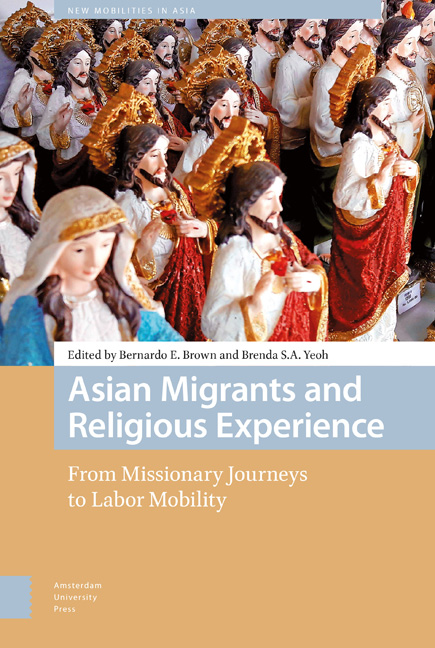Book contents
- Frontmatter
- Contents
- List of Illustrations
- Acknowledgments
- 1 Introduction: Human Mobility as Engine of Religious Change
- Section 1 Mobile Religious Practices
- 2 Saving Yogis: Spiritual Nationalism and the Proselytizing Missions of Global Yoga
- 3 Renewed Flows of Ritual Knowledge and Ritual Affect within Transnational Networks: A Case Study of Three Ritual Events of the Xinghua (Henghua) Communities in Singapore
- 4 Liberalizing the Boundaries: Reconfiguration of Religious Beliefs and Practice amongst Sri Lankan Immigrants in Australia
- Section 2 Transnational Proselytizing
- 5 From Structural Separation to Religious Incorporation: A Case Study of a Transnational Buddhist Group in Shanghai, China
- 6 “10/40 Window”: Naga Missionaries as Spiritual Migrants and the Asian Experience
- 7 Religion, Masculinity, and Transnational Mobility: Migrant Catholic Men and the Politics of Evangelization
- 8 Helping the Wounded as Religious Experience: The Free Burma Rangers in Karen State, Myanmar
- Section 3 Refashioning Religiosity in the Diaspora
- 9 A Multicultural Church: Notes on Sri Lankan Transnational Workers and the Migrant Chaplaincy in Italy
- 10 “Bahala Na Ang Diyos”: The Paradox of Empowerment among Filipino Catholic Migrants in South Korea
- 11 Feeling Hindu: The Devotional Sivaist Esthetic Matrix and the Creation of a Diasporic Hinduism in North Sumatra
- 12 Afterword: What Makes Asian Migrants’ Religious Experience Asian?
- References
- Index
2 - Saving Yogis: Spiritual Nationalism and the Proselytizing Missions of Global Yoga
Published online by Cambridge University Press: 12 December 2020
- Frontmatter
- Contents
- List of Illustrations
- Acknowledgments
- 1 Introduction: Human Mobility as Engine of Religious Change
- Section 1 Mobile Religious Practices
- 2 Saving Yogis: Spiritual Nationalism and the Proselytizing Missions of Global Yoga
- 3 Renewed Flows of Ritual Knowledge and Ritual Affect within Transnational Networks: A Case Study of Three Ritual Events of the Xinghua (Henghua) Communities in Singapore
- 4 Liberalizing the Boundaries: Reconfiguration of Religious Beliefs and Practice amongst Sri Lankan Immigrants in Australia
- Section 2 Transnational Proselytizing
- 5 From Structural Separation to Religious Incorporation: A Case Study of a Transnational Buddhist Group in Shanghai, China
- 6 “10/40 Window”: Naga Missionaries as Spiritual Migrants and the Asian Experience
- 7 Religion, Masculinity, and Transnational Mobility: Migrant Catholic Men and the Politics of Evangelization
- 8 Helping the Wounded as Religious Experience: The Free Burma Rangers in Karen State, Myanmar
- Section 3 Refashioning Religiosity in the Diaspora
- 9 A Multicultural Church: Notes on Sri Lankan Transnational Workers and the Migrant Chaplaincy in Italy
- 10 “Bahala Na Ang Diyos”: The Paradox of Empowerment among Filipino Catholic Migrants in South Korea
- 11 Feeling Hindu: The Devotional Sivaist Esthetic Matrix and the Creation of a Diasporic Hinduism in North Sumatra
- 12 Afterword: What Makes Asian Migrants’ Religious Experience Asian?
- References
- Index
Summary
Abstract
The portable practice of yoga first migrated through unidirectional networks that transported knowledge from India to the West in the early twentieth century. Today, yoga flows through multidirectional and reverse networks, exposing new forms of hypermobility. This chapter analyzes one of these reverse networks by focusing particularly on how North American yogis export yoga globally through proselytization, marketing, and yoga sevā (“selfless service”) tourism. It reveals how these modern yogis construct the practice as a universal good, and the benefits of “doing yoga” are often parsed with religious language. The author argues that the current hypermobility of yoga is more productively analyzed through missiological models of proselytization and conversion as opposed to economic models of production and consumption.
Keywords: yoga, spirituality, secularism, proselytization, globalization, nationalism
Introduction
Many contemporary postural yoga practitioners believe that postural yoga is an ancient spiritual practice birthed on the Indian subcontinent approximately 5000 years ago. The Indian government has reinforced this common popular understanding by revitalizing and claiming yoga as a product of India through global extravaganzas, like the inaugural International Yoga Day (IYD) on 21 June 2015 (Associated Press 2015). In a speech at the United Nations leading up to the 2015 IYD celebrations, Indian Prime Minister (PM), Narendra Modi characterized yoga as “an invaluable gift of ancient Indian tradition” (Suri 2015). Yoga has been similarly framed as India's gift to the world since the rise of nationalism in the early twentieth century. It was championed as such by Swami Vivekananda on his US tours in 1893-1896 and many religious emissaries from India have reiterated this notion since. In the 1990s, Ashok Singhal, the leader of Hindu nationalist political party Vishwa Hindu Parishad (VHP), explained, “Of all nations, India alone has spirituality”, in Hindi, but using the English term “spirituality” (McKean 1996, xv). Yoga has become the most visible form of Indic spirituality to mobilize globally. It has become India's leading spiritual export. Despite its modern-day presentation as a secular physical exercise, yoga is intimately related to Indic religious forms, and as such it has become a leading vehicle for “spiritual nationalism” (van der Veer quoted in Csordas 2009, 263).
- Type
- Chapter
- Information
- Asian Migrants and Religious ExperienceFrom Missionary Journeys to Labor Mobility, pp. 35 - 70Publisher: Amsterdam University PressPrint publication year: 2018
- 1
- Cited by



